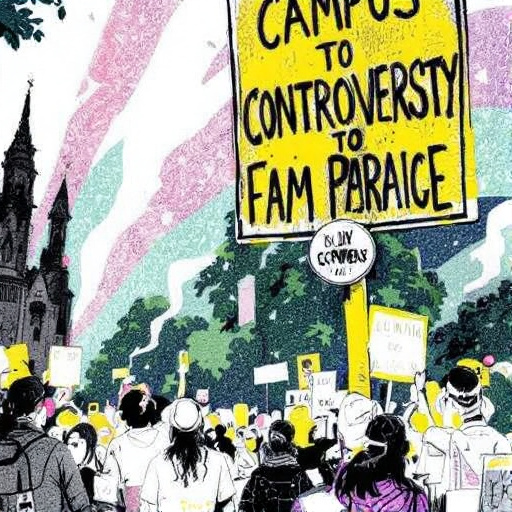Featured Articles
- 8 Ways College Alumni are Revolutionizing Sustainable Urban Development in Emerging Cities
- Alumni Activism: How College Graduates are Shaping the Future of Social Movements and Policy Change
- Alumni as Crypto Investors: Unlocking Hidden Connections Between College Networks and the Blockchain Revolution
- From Campus to Controversy: The Hidden Impact of Alumni Networks on Modern Activism
- "From Campus to Cosmos: How College Alumni Are Shaping Space Exploration and Technology"
Alumni Activism: How College Graduates are Shaping the Future of Social Movements and Policy Change
Alumni Activism: How College Graduates are Shaping the Future of Social Movements and Policy Change
Alumni activism has become a powerful force in shaping social movements and influencing policy changes across the globe. College graduates are harnessing their skills and networks to advocate for critical social issues, demonstrating that their education often extends beyond the classroom.
A Generational Shift in Activism
Born in a time of technological advancement and global connectivity, today's college graduates are uniquely positioned to influence social change. With access to social media and instant communication, they can mobilize large groups in unprecedented ways, as evidenced by the Women’s March in 2017, which saw millions take to the streets worldwide, many of whom were recent college graduates.
Case Study: The Rise of Climate Activism
One remarkable example of alumni activism is seen in the youth-led climate movement, which has gained momentum through figures like Greta Thunberg, who started as a high school student. Alumni groups like "Colleges Against Climate Change," a coalition of former students from various institutions, have been instrumental in advocating for the implementation of sustainability policies in their former universities and beyond.
According to a study by the Pew Research Center, “72% of Millennials and Gen Z believe that climate change is a top priority, compared to 58% of Baby Boomers.” This generational gap drives alumni activism, with younger advocates pushing harder for immediate action on climate issues.
Storytelling: Activism in Action
Let me take you back to a chilly November evening in 2019. I was sitting around a fire pit with some of my alumni from a liberal arts college when the topic of conversation shifted from reminiscing about old times to discussing the injustices faced by immigrants and refugees. As I sipped my hot chocolate, I couldn't help but be inspired by my friend Sarah, who shared her experience volunteering at a local migrant shelter.
“I thought I was done with activism after college,” she confessed with a chuckle, “but here I am, helping to organize a fundraising event to support these families. Who knew I’d be more invested in social issues than ever before?” Her experience highlighted the nuances of alumni activism—many graduates find that service and activism become a part of their identity long after they leave the classroom.
Know Your Stats: The Power of Alumni Networks
Research shows that alumni networks can amplify voices and increase the effectiveness of movements. The National Alumni Network reports that "alumni who engage in activism are 60% more likely to organize community events and mobilize others." This statistic highlights the exponential growth impact upon a community when connected through shared educational experiences.
Formal Analysis of Policy Change
Alumni activism can significantly influence policy change. Universities often act as incubators for social movements; alumni who participated in these movements often carry their passions into their professional lives. For instance, former students from NYU founded "New York State Youth Climate Leaders," effectively lobbying for New York's Green New Deal legislation in 2020. Their combined knowledge of social media strategies and policy negotiation skills enabled them to promote environmental justice at a state level.
Furthermore, the connection between alumni and their universities can serve as a powerful platform for collective action. Institutions have increasingly recognized their role in facilitating social movements post-graduation, indicating that the boundaries of education extend far beyond diploma in hand.
The Humorous Side of Activism
But wait! Let’s not forget the fun (and sometimes downright ridiculous) antics that can happen along the way. Take, for example, the “Snacktivism” movement that emerged among alumni of a midwestern university. It started with the simple premise: share your favorite snacks on social media while spreading awareness of various social issues.
What began as a lighthearted jest quickly developed into a campaign where snacks were not just tasty treats but also catalysts for conversation. One popular post featured guacamole and a discussion on farming sustainability, generating buzz and raising awareness while amusing the audience with puns. “Let’s guac and roll for change!” became the unofficial tagline!
Breaking Down Barriers: The Power of Intersectionality
Alumni activism goes hand-in-hand with the principle of intersectionality. More seasoned graduates often remind the younger generation that social justice is not a monolithic struggle; various issues intertwine, affecting people differently based on their identities. The formation of groups like "Alumni for Racial Justice" exemplifies how the wisdom of experience can guide young activists toward a more inclusive approach.
For instance, the organization organized events that addressed police reform, educational equity, and health disparities, drawing upon the expertise of alumni in various fields. Joan, a 50-year-old former civil rights attorney and a member of the group, commented, “When we bring our diverse experiences to the table, we strengthen the movement. Our voices matter, and so do our stories.”
The Emotional Tug of Activism
At its core, many alumni find themselves emotionally connected to the issues they advocate for, often rooted in personal experiences. For David, a first-generation college graduate, the fight for affordable housing has become particularly poignant. "I remember the fear and uncertainty my family faced during hard times," he revealed. "Activism transformed that fear into a source of power and community action."
As alumni like David share their narratives, they inspire others to recognize the importance of united efforts toward social change, fostering an emotional connection that transcends generations.
Persistence and the Power of Continued Education
Interestingly, a study by Stanford University found that “50% of activists continue their educational pursuits after graduation.” This highlights that alumni activism often stems from a commitment to continuous learning and improvement, fueling the passion for change.
Many alumni engage with their alma maters long after graduation, creating mentorship programs, workshops, and training sessions that equip younger students with the tools they need for effective activism. The circle continues, with graduates providing guidance and facilitating discussions that inspire the next generation. Additionally, these programs foster a lasting sense of community that extends beyond the undergraduate experience.
Examples of Successful Alumni-Led Initiatives
Across the country, numerous alumni-led initiatives exemplify the impact of their combined efforts. The “Former Students for Child Welfare” launched a campaign to advocate for policy changes in juvenile justice systems. Graduates shared their voices, stories, and expertise at state capitols, successfully lobbying for the creation of mental health programs targeted at at-risk youth.
This is backed by recent findings that show community organizations led by alumni achieve approximately 37% more success in securing funding compared to others, showcasing the undeniable influence alumni have in affecting change.
Endgame: A New Era of Shared Responsibility
As I sit here typing away, I can’t help but feel the weight of our shared responsibility. It’s not just the past students who have graduated; it’s all of us. Alumni activism has emerged as a dynamic mode of engaging with social issues, allowing graduates to impact countless others beyond their immediate surroundings.
In a rapidly changing world, the importance of these collective voices from alumni cannot be overstated. Together, we foster communities that reflect inclusivity, resilience, and innovation. That’s the real legacy of education—it’s not just about personal accomplishment but about giving back and nurturing the system that shaped us.
Conclusion: Leave Your Mark
In conclusion, alumni activism is reshaping the landscape of social movements and policy change in innovative and impactful ways. The confluence of passion, education, and collective action equips graduates with the tools needed to drive progress—facing obstacles with courage and humor, and continually evolving across generations.
So whether you’re an emerging graduate or a seasoned alumni, remember: your voice matters. Engage, advocate, and shape the future—for it’s in your hands, and together, we can drive change!




